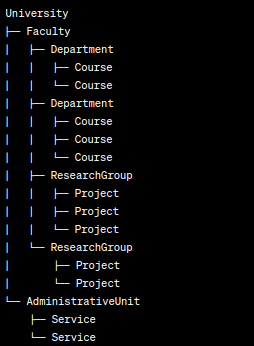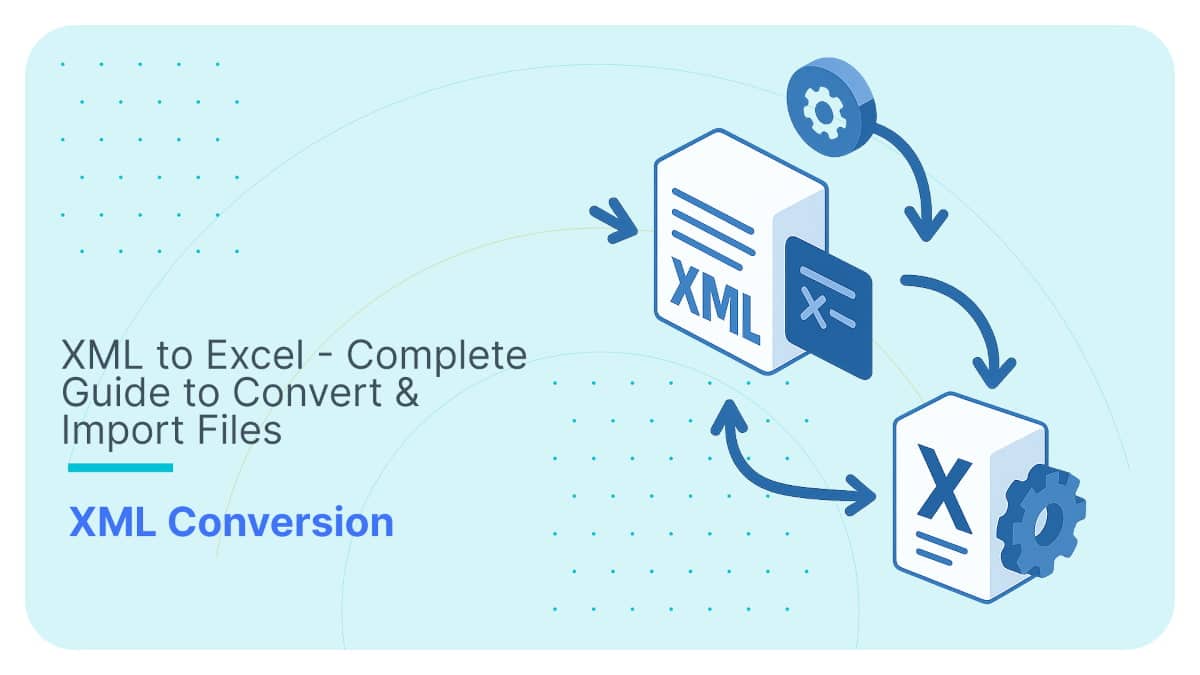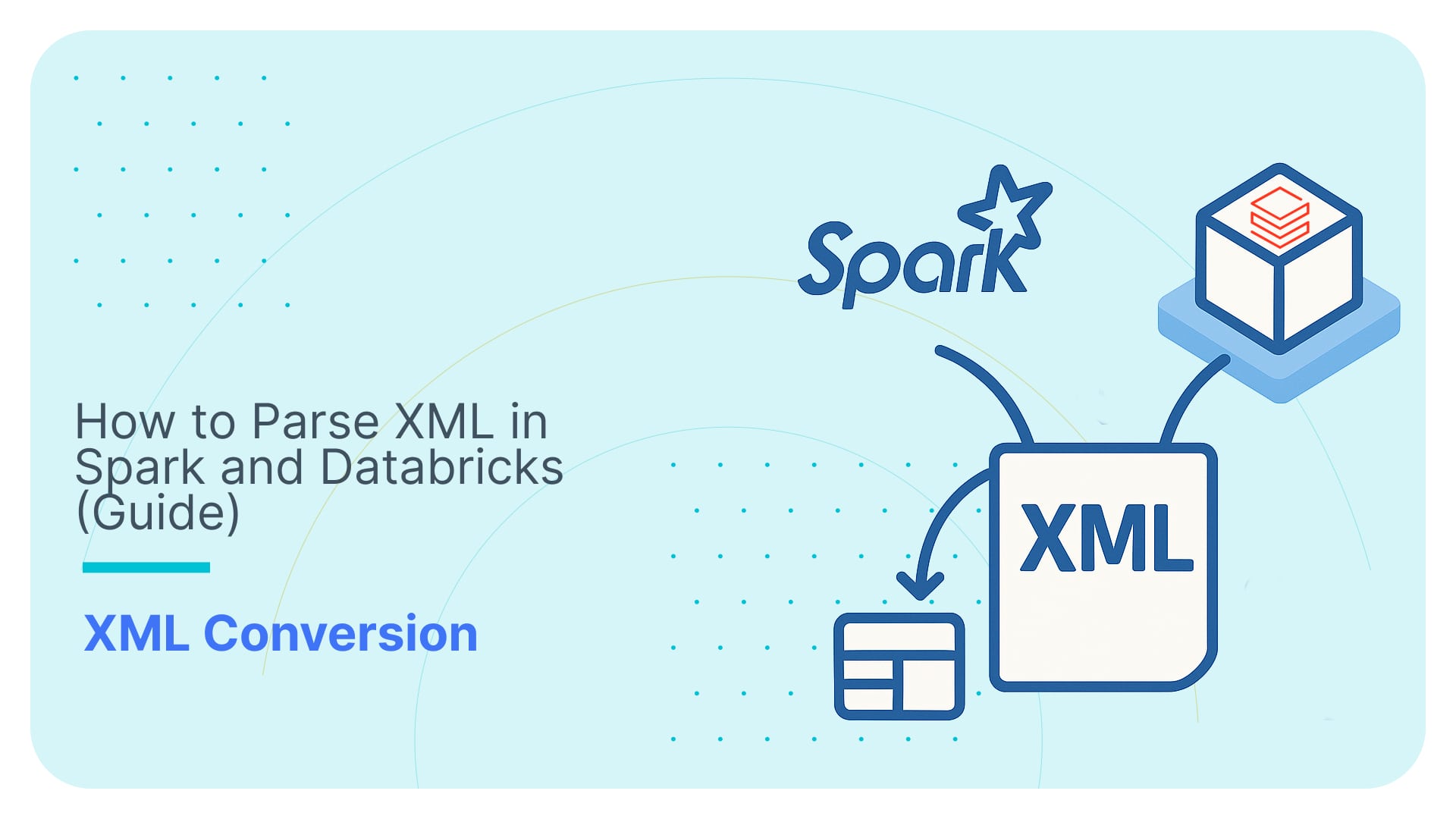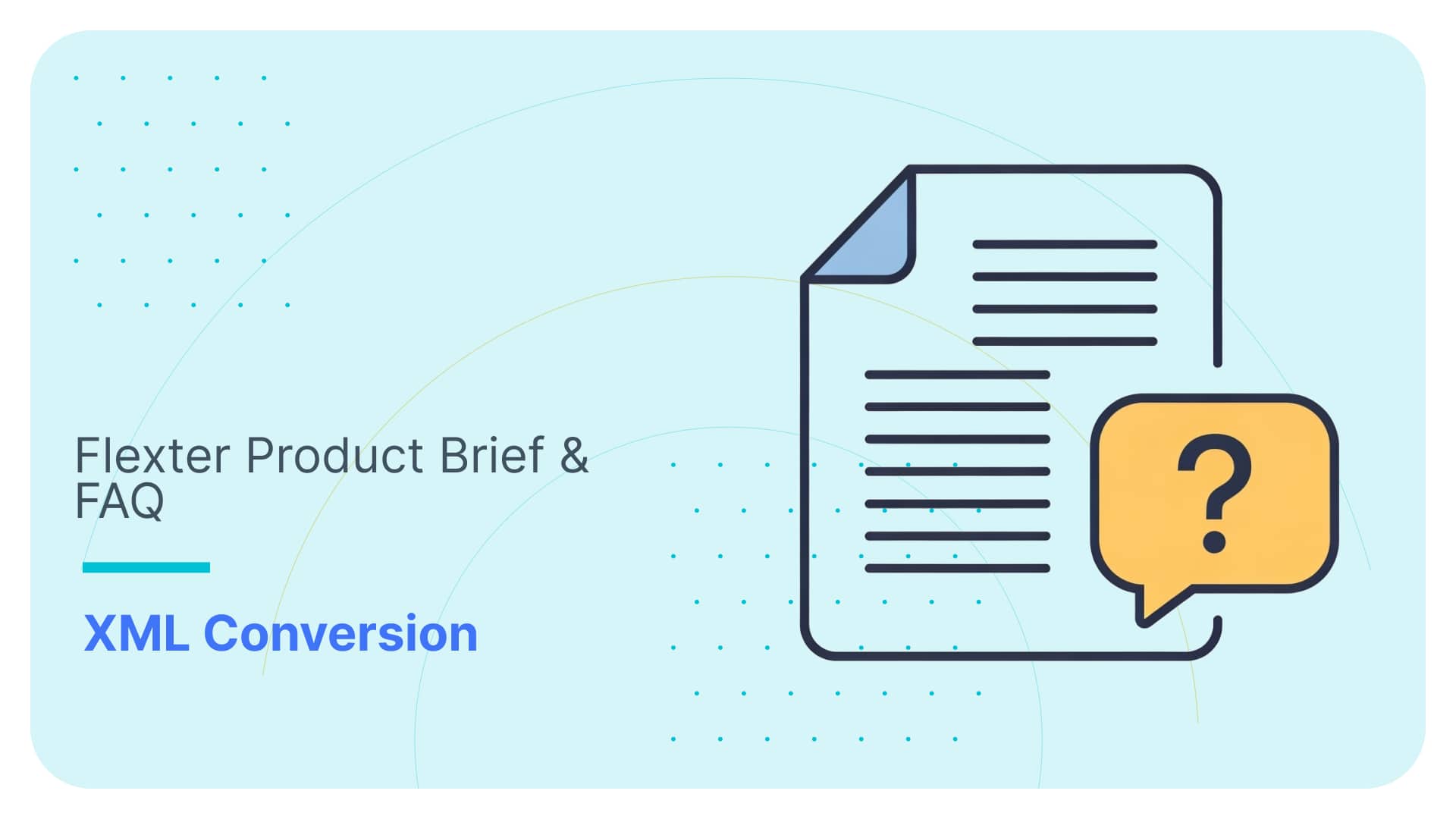Should you Use Outsourced XML Conversion Services?
What is an XML conversion service?
When companies need to process and convert XML documents they have two basic choices. They can either implement an XML conversion solution in-house with their own staff and employees or use an outsourced XML conversion service.
An XML conversion service is an outsourced third party service that converts XML between different formats.
The third party either offers the XML conversion service as a professional service or as an XML conversion tool, aka Software as a Service.
Here, we’re gonna help you understand the benefits of outsourcing XML conversion, and then pick between traditional XML conversion services and an enterprise platform that can automate your XML conversion process.
The following section will provide guidance on when to opt for an XML conversion service and when to perform the conversion internally.
Why XML conversion matters
When we talk about XML conversion we mean the translation of data stored and serialised in XML to another format or vice versa. XML is often used for exchanging data between companies. It’s a great fit for this scenario. However, it is not a good format for other use cases such as data analysis. For data analysis, reporting and dashboards, XML documents need to be converted to a different format.
When should you outsource XML conversion?
Converting XML is difficult. From our own experience, many XML conversion projects run over budget or fail entirely. The two main reasons for outsourcing XML conversion are complexity of XML and the lack of XML skills of software engineers.
Use Flexter to turn XML and JSON into Valuable Insights
- 100% Automation
- 0% Coding
I have listed some common benefits of outsourcing your XML conversion project.
- Complexity of XML: XML documents can be very complex,particularly if they are based on industry data standards such as FpML, HL7, ISO 20022 or similar.
- Lack of Expertise: XML skills are specialised and relatively uncommon among engineers. Not many developers possess expertise in complex XML technologies like XSLT or XQuery, and acquiring these skills isn’t a high priority due to their limited marketability. In situations where your organisation lacks in-house XML expertise or the necessary resources for effective XML conversion, outsourcing to an XML conversion service becomes a particularly valuable option. This is especially true when dealing with complex XML requirements such as the previously mentioned industry data standards or platforms such as Duck Creek, Guidewire, Workday etc.
- Volume and Scalability: If you have a large volume of XML data to convert, outsourcing provides scalability. Parsing and transforming XML, especially large or deeply nested XML files, can be resource-intensive. The lack of skills leads to solutions that don’t scale well. Solutions that are developed in-house by companies may satisfy the functional requirements and work with small volumes of data but fail completely for larger volumes of data or are not able to meet SLAs.
- Cost Savings: Outsourcing XML conversion can often be more cost-effective than building and maintaining an in-house team and infrastructure for occasional or non-core tasks.
- Focus on Core Competencies: Outsourcing non-core activities like XML conversion allows your organisation to focus on its core competencies and strategic initiatives, improving overall efficiency and productivity.
- Tight Deadlines: When you have tight project deadlines and need to complete XML
conversion quickly, outsourcing to a specialised XML conversion service with dedicated resources can help meet time-sensitive requirements. - Access to Technology: Outsourcing XML conversion can give you access to advanced tools, software, and technology stacks that fully automate XML conversion.
- Quality Assurance: Quality assurance processes exist to ensure accurate and reliable XML conversion, reducing the risk of errors. Decades of XML conversion experience have gone into the conversion service.
If your XML conversion needs are simple and straightforward, and your development team has the capacity, it’s advisable to handle the XML conversion internally.
However, if your XML conversion requirements are complex, it’s worth outsourcing the project to a third-party provider, even if your team possesses some XML expertise.
What type of XML conversion service should you choose?
Once you’ve made a decision regarding outsourcing you need to make a decision on the type of XML conversion service you want to use. XML conversion services come in two flavours.
XML conversion as professional services
XML conversion as a professional service creates custom conversion solutions through manual coding. When picking this option you hire a team of third party XML engineers. The client provides them with specifications and shares all of the XML documents that require conversion. This can be problematic from a data protection perspective. It may require obfuscation or anonymising data in XML documents that are shared.
The service provider’s analysts will then go through the requirements and work with the developers who will write the code that converts the XML you provide to the specified format. Depending on the requirements and the complexity this step can take several weeks. It should also include unit tests.
Once the third party provider has written the code the engineers need to write up documentation. Only at this point does the service provider share the implementation code with the client. The client can then install and deploy the code inside its IT infrastructure. This requires a handover between the developers of the client and the developers of the conversion service.
XML conversion as Software Service
Another option for XML conversion services is XML conversion as Software. In this model the client uses an XML conversion tool to automate the conversion of XML.
The software is installed and uses an automated XML conversion approach to convert XML to the desired output.
Free XML converters
When you look for XML conversion, XML converter, or XML conversion service on search engines you will come across dozens of free online tools that convert XML to text files or Excel.
These converters only work for the most basic of conversion requirements. Some of the limitations you will encounter:
- No support for programmatic access or automatic conversion via SDK or API
- No support for XSD
- No support for batch conversion of multiple XML documents
- No support for different versions of XML
- No support for relational databases as output
- No support for normalisation
- Most XML documents contain multiple branches. XML flattening will either fail with these tools or produce incorrect results in the form of cartesian results.
Example: XML with multiple branches
We used the following simple XML document with two branches
|
1 2 3 4 5 6 7 8 9 10 11 12 13 14 15 16 17 18 19 20 21 22 23 24 25 26 27 28 29 30 31 |
<University> <Faculty id="Engineering"> <Department id="ComputerScience"> <Course>Introduction to Programming</Course> <Course>Algorithms and Data Structures</Course> </Department> <Department id="ElectricalEngineering"> <Course>Circuit Analysis</Course> <Course>Electromagnetics</Course> <Course>Control Systems</Course> </Department> <ResearchGroup id="ArtificialIntelligence"> <Project>Machine Learning Advances</Project> <Project>Neural Network Optimization</Project> <Project>AI Ethics and Society</Project> </ResearchGroup> <ResearchGroup id="Nanotechnology"> <Project>Nano-materials Engineering</Project> <Project>Quantum Computing</Project> </ResearchGroup> </Faculty> <AdministrativeUnit id="Library"> <Service>Book Lending</Service> <Service>Research Assistance</Service> </AdministrativeUnit> <AdministrativeUnit id="Coffee Shop"> <Service>Food</Service> <Service>Coffee</Service> </AdministrativeUnit> </University> |
As you can see there are two branches branching of the University node’s tree
- Faculty
- AdministrativeUnit

Even though we are dealing with a very simple XML structure with just two branches off the root element of University, none of the free XML conversion tools were able to convert the XML to text.

We have created Flexter, an enterprise XML conversion tool that addresses all of these and other limitations.
Let’s have a look at the features and benefits of advanced XML converters.
Enterprise XML converters
Although free online XML conversion tools often can’t manage the complexity of real-life XML data, there are paid versions that can. And these paid tools are cheaper and more effective than traditional XML conversion services. So, you should definitely take them seriously. Here are a few benefits.
- Speed and Efficiency: Automated XML Conversion streamlines XML processing. It offers swift and error-free processing compared to time-consuming and error-prone manual coding, particularly for large and complex XML datasets.
- Risk reduction: Installing and testing the software will give you first hand evidence that the XML conversion tool works. Using an XML converter you will minimise the risk of project failure and significantly increase the chances of project success.
- Accuracy: XML conversion software is designed to handle complex scenarios accurately, reducing the risk of errors that can occur during manual coding.
- Reduced Development Time: Software eliminates the need to write custom code for every conversion scenario, saving development time and effort.
- User-Friendly: Many XML conversion tools provide user-friendly interfaces that make it accessible to users with varying levels of technical expertise. Manual coding often requires specialised skills.
- Optimisation: Some XML conversion tools optimise the output of the XML conversion for easy consumption by users.
- Scalability: XML conversion software can handle large volumes of XML and scales easily to accommodate growing needs.
- Standardisation: Software adheres to predefined standards and best practices, ensuring consistency in data transformation such as naming conventions. Manual coding may lack standardisation.
- Change management and refactoring: XML documents can change frequently, which requires manual support and refactoring.
- Lower Maintenance Overhead: XML conversion software typically requires less ongoing maintenance compared to custom-coded solutions, which may need frequent updates and bug fixes.
- Reusability: XML conversion software can handle any type of XML and not just a particular type of XML.
- Integration with Other Tools: Many XML conversion tools offer integration options with other software and databases, enhancing their versatility and usability in various contexts.
- Error Handling: XML conversion software often includes error-handling mechanisms, enabling the identification and management of data-related issues.
- Cost-Efficiency: While there may be upfront costs associated with acquiring XML conversion software, it can result in cost savings in the long run due to increased productivity, increased reliability, automation, and reduced manual effort.
- Documentation and Support: XML conversion tools auto generate documentation such as data lineage documents and ER diagrams. They also include customer support.
Here is a quick comparison between the two options.
|
Aspect |
XML Conversion as Professional Service |
XML Conversion as Software |
|---|---|---|
|
Productivity |
Lower efficiency |
High efficiency |
|
Go-live |
Extended development timeline |
Immediate deployment to production |
|
Risk |
Higher risk of project failure and budget overruns |
Lower risk |
|
Automation |
Minimal automation |
Fully automated XML conversion |
|
Optimization |
Limited optimisation | |
|
Reusability |
Limited reusability. Tailor made solution |
High reusability. Generic (supports any XML) |
|
Scalability |
Limited scalability |
High scalability |
|
XML Schema Definition (XSD) |
XSD specifications are neglected |
Full support for XSD specifications |
|
JSON Conversion |
Not included as standard |
Largely supported as a bonus |
We have created Flexter, an enterprise solution for XML conversion as software. You can install it in your own environment or cloud so that you can benefit from all the XML conversion advantages that this model offers.
We used free online Flexter to convert the XML document that failed with the free online XML converters.
Here is the output of Flexter represented as an ER diagram.

As you can see Flexter was able to easily handle multiple branches inside the XML. It applied the correct normalisation. It created parent – child relationships and parent and foreign keys.
XML conversion service checklist
We have compiled a checklist for outsourcing your XML conversion project. When hiring an XML conversion service you need to ask yourself the following questions:
- What is your timeline and deadline? How long will it take the XML conversion service provider to implement the solution?
- Should I go for a manual conversion approach or select an XML conversion software to automate the conversion process? In the previous section we have listed various benefits of automated XML conversion using an XML conversion tool.
- What XML converter features should I be looking for when selecting XML conversion software?
- Can you share XML documents with the conversion service provider? Is sensitive or personal data (PII) part of your XML documents?
- Does the service provider offer support? What type of support do you require, e.g. support outside business hours.
- What is the cost of the XML conversion service?
- Do you prefer an automated or manual coding approach? With an automated XML conversion approach you will see results instantly and shorten the implementation life cycle.
- Does the service provider offer support? Is the support cost billed separately or part of the offering?
- Is documentation, training, and handover included in the offering?
- Does the XML conversion service support the output (database, text) or input format (PDF, Word, Excel) that is required?
- Will the service provider also implement the XML conversion data pipeline and workflow including logging and alerting?
- How will the service provider schedule the XML conversion process?
- What type of testing is provided?
- How will the service provider manage changes to an XML document? What is the change management process? How frequently does the XML change?
- Do we want to convert from XML to another format or do we want to convert from another format to XML?
- How does XML conversion affect data security and data privacy?
- Can the service provider handle large volumes of data and how? Is the conversion process scalable for future requirements?
- Can the service provider convert very large XML documents?
- How can I ensure data accuracy during XML conversion?
XML conversion software changes the definition of XML conversion services
For simple XML documents you can use your own engineering staff to convert the data even if they have no experience working with XML previously. You should use an XML conversion service if you have complex XML documents and XML conversion requirements.
If you are facing complex XML conversion requirements using an XML conversion service and outsourcing the requirement is generally beneficial.
When opting for an XML conversion service you should choose an XML conversion software aka XML converter. You will benefit from the automation boost in productivity that the tool provides even if your developers have skills and experience working with XML. XML converters automate the conversion process and substantially reduce the time required to go live and reach production.
Timeline: XML conversion as professional service

Timeline: XML conversion as Software

You need to make sure that you select an XML conversion tool that is fit for purpose and meets your requirements. You will find many free online services that claim to convert XML. However, these tools only work for the most basic requirements.
For complex XML conversion in the enterprise we provide Flexter as an XML conversion software. With Flexter you can reap the benefits of automated XML conversion
- Convert any XML in seconds.
- Fully automated
- Go live instantly. Decision makers get instant access to data. Engineers can add real value.
- Minimise the risk of XML conversion project failure
Try XML conversion online for free with Flexter, Sonra’s XML converter for enterprise use cases.






